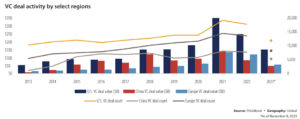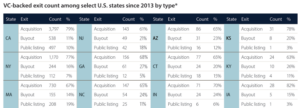By Doug Kelly, CEO, American Edge
In a high-stakes race for global tech leadership, America faces challenges from China’s rising tech ambitions and a regulatory landscape growing more restrictive by the day. This battle isn’t just about technology; it’s about geopolitical influence and economic power for decades to come.
As U.S. lawmakers eye the stringent regulatory models of China and Europe – this week alone Congress is considering 10+ new pieces of legislation targeting U.S. tech companies – the American Edge Project (AEP), in collaboration with PitchBook, has unveiled a new study examining how these regulations stifle innovation. Analyzing venture capital trends across the United States, China, and Europe—which together account for 49 percent of global GDP—the study aims to caution U.S. policymakers against enacting policies that could undermine America’s tech dominance and innovation. Here are the pivotal findings.
- Venture Capital Is Critical To Innovation Across All Countries – Especially The United States
- USA: Thanks to a regulatory environment conductive to growth, in 2021, the United States showcased its robust VC landscape with 19,000 deals amounting to $350 billion. This was double the combined contributions of China and Europe and led to a surge of innovation.
- China: With significant government backing, China witnessed notable growth in its venture ecosystem, growing over seven times in VC investment and five times in deal count from 2013 to 2023, surpassing U.S. growth rates and underscoring a rapid innovation expansion.
- Europe: In contrast, Europe’s VC sector, constrained by regulatory overreach and market fragmentation, lagged behind, with deal counts and values representing only 22 to 48 percent of the United States from 2013 to 2023, reflecting fewer startups and diminished innovation.
- Excessive Government Regulation Slows VC Activity And Innovation
- China: From 2018 to 2019, China experienced a sharp decline in venture dealmaking and fundraising due to a government crackdown affecting key technology sectors. This crackdown slowed economic growth, erased $6 trillion in equities, and has led to a reduced foreign venture investment amidst growing geopolitical tensions. China has since reversed course somewhat in an attempt to stimulate growth.
- Europe: Its innovation ecosystem is hampered by regulations, such as the General Data Protection Regulation (GDPR) and the Digital Markets Act (DMA), leading to reduced startup investments and keeping venture activity behind the United States Since 2018, the GDPR has cut investments, and the DMA could impose $50 billion in costs, potentially pushing 16 percent of European firms to Chinese tech and slowing research and development (R&D) with fines.
- USA: A growing wave of regulatory actions and proposals at federal and state levels threatens domestic tech industry growth and innovation. These include antitrust legislation/litigation, aggressive Federal Trade Commission (FTC) and Department of Justice (DOJ) enforcement, restrictions on mergers and acquisitions (M&A), European-style state regulations, restrictions on artificial intelligence (AI), and more.
- State Innovation Is Propelled By VC Activity – And Threatened By Regulatory Overreach
- VC-fueled innovation hubs are expanding nationwide: The study shows how lesser-known innovation hubs – Miami, Philadelphia, Indianapolis, and others – are among the fastest growing in VC deal counts since 2023. That underscores the need for lawmakers at the federal and state levels to approach regulation with extra deliberation to support the evolving nationwide entrepreneurial ecosystem.
- New M&A rules may harm state startups: AEP’s study of VC trends shows 73 percent of VC-backed exits in states were acquisitions, with only 10 percent public listings and 17 percent buyouts. New DOJ/FTC M&A restrictions could slow growth, capital formation, and job creation across the country. The study provides 2013-23 exit data for 40 states on page 10.
- Recommendations On How U.S. Can Win The Innovation Race
- U.S. policymakers must craft a forward-looking agenda that champions and accelerates innovation, ensuring America’s position as global leader in technology remains unchallenged and continues to advance our national security, economy, and democratic principles across the globe.
- Specific recommendations include enhancing regulatory transparency, preserving favorable tax conditions for VC investments and R&D, fostering Science, Technology, Engineering, and Math (STEM) education partnerships, and scrutinizing foreign investments for intellectual property (IP) security. These measures aim to bolster the national innovation ecosystem, enhancing U.S. and allied security and globally spreading technological benefits.


